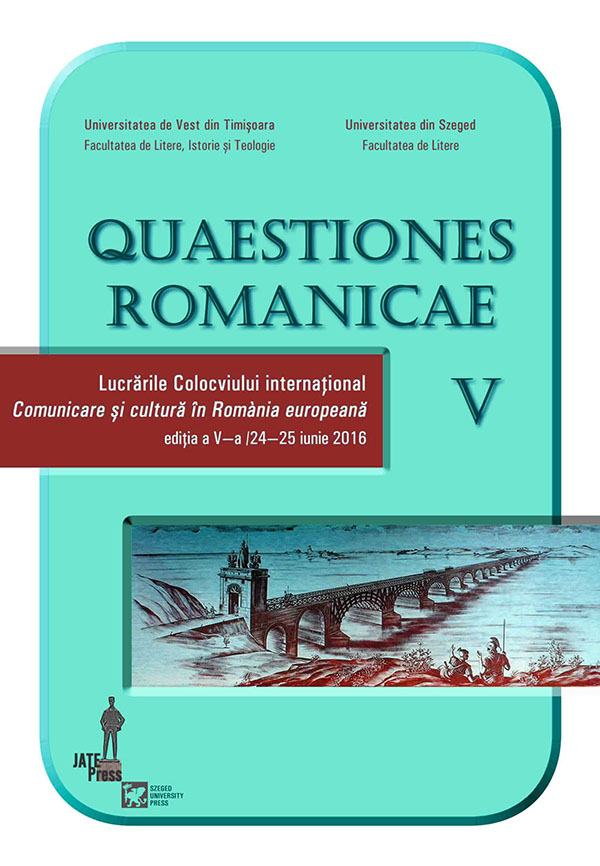L’occupazione italiana della Grecia (1941-1943) in due opere narrative italiane degli anni ’50: Sagapò (1953) di Renzo Biasion e Le soldatesse (1956) di Ugo Pirro
Abstract: (The Italian Occupation of Greece (1941-1943) in Two Italian Narrative Works of the Fifties: S’agapò (1953) by Renzo Biasion and Le soldatesse (1956) by Ugo Pirro) The demolition of the Italians good people myth is clearly presented in these two works, written by two authors who have directly participated in the Italian occupation of Greece between 1941 and 1943. The myth of the Italians good people has followed for too much time the participation of the Italian troops in the Second World War and has prevented later from a serious evaluation, in a historical perspective too, of the Italian army behaviour in various occupied territories. The book of tales by Renzo Biasion reveals all the unpreparedness of the Italian military for a conflict that proved to be greater than the limited means of the country. All these are well reflected in the case of the Italian occupation of Greece, especially in the relations between the Italian soldiers (who were in a situation that seemed hopeless) and the civilian population. On the other hand, the novel of Ugo Pirro reminds of a black page of that period: the recruitment of young women, who could otherwise starve, as prostitutes (the soldiers of the title) for the Italian army of occupation. The publication of these two books, aroused controversy in Italy in the 50s: in fact, at that time, Italy was in the middle of the Resistance trial and thus it established a real historical continuity between fascism and post-fascism. Italy could not welcome the appearance of two works which put into serious doubt the eternal good behaviour of Italian soldiers, as well as the honour of the army they belonged to, during the second World War, although the one and the other were in the service of a fascist war.
Keywords: demolition; myth, occupation; women soldiers; Italians good people.
Riassunto: In queste due opere, scritte da due autori che parteciparono direttamente all’occupazione italiana della Grecia fra il 1941 ed il 1943, appare fin da quel momento chiara la demolizione di un mito, quello degli Italiani brava gente che per fin troppo tempo ha accompagnato la partecipazione delle truppe italiane alla seconda guerra mondiale ed impedito poi una seria valutazione, anche sul piano storico, del loro reale comportamento nelle varie zone occupate. Se nel libro di racconti di Renzo Biasion viene mostrata tutta l’impreparazione militare dell’Italia ad un conflitto che doveva rivelarsi più grande dei limitati mezzi di cui il paese poteva allora disporre - e che si riflette bene nel caso dell’occupazione italiana della Grecia, anche e soprattutto nei rapporti fra i soldati italiani, trovatisi in una situazione che parve senza via d’uscita, e la popolazione civile - , nel romanzo di Ugo Pirro viene ricordata una della pagine nere di quel periodo: il reclutamento di giovani donne, che altrimenti rischiavano di morire di fame, come prostitute - le soldatesse del titolo - per l’esercito italiano di occupazione. La pubblicazione di questi due libri, suscitò polemiche nell’Italia degli anni ’50: infatti, in quel periodo, un paese che faceva il processo alla Resistenza e che così stabiliva una vera e propria continuità storica tra fascismo e post-fascismo, non poteva certo gradire l’apparizione di due opere come queste, che mettevano in forte dubbio l’eterno buon comportamento dei soldati italiani e, quindi, l’onore dell’esercito cui appartenevano, durante il secondo conflitto mondiale, anche se gli uni e l’altro erano al servizio di una guerra fascista.
Parole-chiave: demolizione; mito, occupazione; soldatesse; Italiani brava gente.
